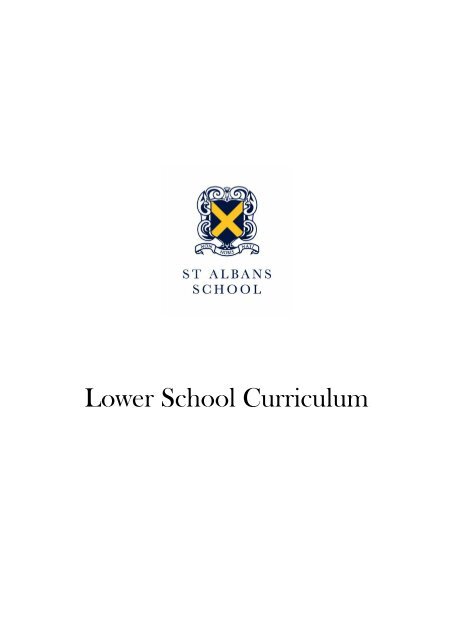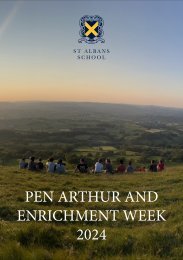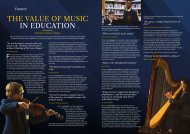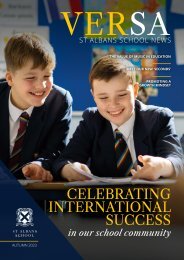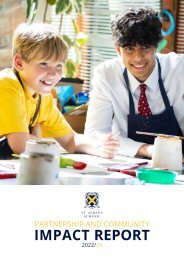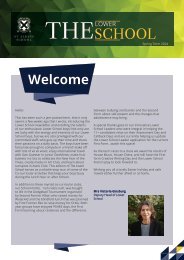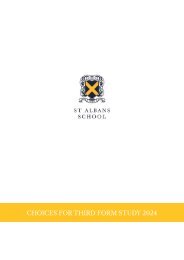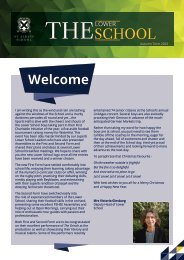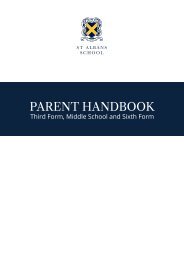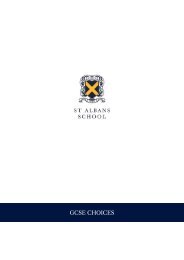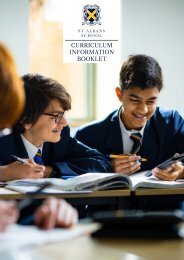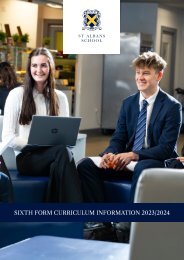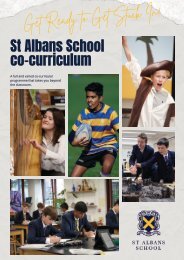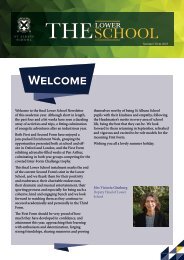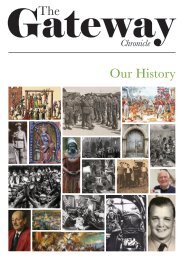Lower School Curriculum booklet 2022-2023
Create successful ePaper yourself
Turn your PDF publications into a flip-book with our unique Google optimized e-Paper software.
<strong>Lower</strong> <strong>School</strong> <strong>Curriculum</strong>
CONTENTS<br />
Preface 2<br />
Introduction 3<br />
Schedule of Periods 4<br />
Art 5<br />
Computing 5<br />
Drama 6<br />
Design & Technology 7<br />
English 8<br />
Geography 9<br />
History 9<br />
Latin 10<br />
Mathematics 11<br />
Modern Languages 12<br />
Music 13<br />
Physical Education and Games 14<br />
Personal and Social Education 15<br />
Religion, Philosophy and Ethics 15<br />
Science 16<br />
Tutors and Pastoral Care 17<br />
1
PREFACE<br />
St Albans <strong>School</strong> is an academically selective school and all pupils in the <strong>Lower</strong> <strong>School</strong> have<br />
shown their potential in successfully meeting our requirements in the entrance examination.<br />
Nevertheless, our pupils come from a wide range of backgrounds – educational, cultural and<br />
social – and will have had very diverse experiences of school before coming here.<br />
The curriculum in the <strong>Lower</strong> <strong>School</strong>, therefore, whilst it shares many of its aims with the<br />
curriculum throughout the rest of the <strong>School</strong>, is designed to take into account the inevitable<br />
process of adjustment. Our Learning to Learn (LTL) programme enables pupils to establish a<br />
framework of study which facilitates effective and efficient learning strategies. Pupils need to<br />
develop self-discipline and independent thinking skills in a more formal environment than<br />
many of them have previously encountered; they will also need to develop and awareness and<br />
understanding of the aims and ethos of the <strong>School</strong> so that they can thrive in its environment.<br />
Some pupils will meet homework for the first time, whilst others will already be used to<br />
anything up to two hours per night. Tutors will provide help and support for pupils in<br />
developing skills of organisation and prioritisation to balance their work with other<br />
commitments whilst supporting their wellbeing.<br />
The long-term academic objective of the curriculum in the <strong>Lower</strong> <strong>School</strong> is to ensure that<br />
pupils who join us at age eleven become effective learners, have reached the same academic<br />
level at the age of thirteen as those pupils who join us through Common Entrance from<br />
academic preparatory schools, and that all our pupils are well prepared to begin their career<br />
in the Middle <strong>School</strong> which will take them on to GCSE.<br />
In the pages which follow, you will find a detailed explanation of the curriculum in the first<br />
two years.<br />
Jonathan Gillespie<br />
Headmaster<br />
2
INTRODUCTION<br />
St Albans <strong>School</strong>, as an independent school, can offer a curriculum broadly based on the<br />
National <strong>Curriculum</strong> while giving pupils the opportunity to study additional subjects.<br />
This <strong>booklet</strong> describes the current provision for the <strong>Lower</strong> <strong>School</strong>.<br />
Aims of the <strong>Lower</strong> <strong>School</strong> <strong>Curriculum</strong>:<br />
• To develop imaginative, enquiring, and informed minds.<br />
• To promote personal excellence in the pursuit of a wide range of sporting, recreational and<br />
cultural activities.<br />
• To develop metacognitive skills through our Learning to Learn (LTL) programme.<br />
• To provide opportunities for self-expression and aesthetic appreciation.<br />
• To develop moral and spiritual values and a respect for other cultures<br />
• To provide a balance between the various areas of learning.<br />
• To connect learning through the application of knowledge, strategies, skills and values.<br />
• To provide a rich educational environment which encourages a range of teaching and<br />
learning styles.<br />
• To provide carefully defined schemes of work which allow for differentiated teaching to cater for<br />
the varied needs of the pupils.<br />
• To be sufficiently broad to enable pupils to develop their talents and interests in a variety<br />
of fields.<br />
• To prepare pupils for academic achievements which will enable them to pursue their<br />
ambitions in life.<br />
In common with the curriculum in all sections of the <strong>School</strong>:<br />
• To promote the pupils’ intellectual, moral, physical, social and spiritual development and<br />
prepare them for future opportunities, responsibilities and experiences.<br />
3
SCHEDULE OF PERIODS<br />
Subject First Form Second Form<br />
Art 1 1<br />
Computing 1 1<br />
Design Technology 1 1<br />
Drama 1 1<br />
English 3 4<br />
French 2 2†<br />
Geography 2 2<br />
German 1* 2†<br />
History 2 2<br />
Latin 2 2†<br />
Mandarin Chinese 1* 2†<br />
Mathematics 3 3<br />
Music 1 1<br />
PE & Games 3 3<br />
Religion, Philosophy and Ethics 2 1<br />
Science 4 3<br />
Spanish 1* 2†<br />
Learning to Learn 1 1<br />
Total 30 30<br />
* A carousel arrangement: pupils have taster courses in German, Mandarin Chinese and<br />
Spanish over the year during one period.<br />
† Pupils choose to take three of French, German, Latin, Mandarin Chinese and Spanish.<br />
4
ART<br />
Art and Design have a crucial role within any curriculum. Pupils today learn as much<br />
through visual images as they do through words. The understanding of visual information is a<br />
necessity for any pupil in today’s ever-changing world. Pupils need to learn that pictures,<br />
artefacts, and symbols can have several meanings and that different interpretations of them<br />
are possible in a modern civilised and multicultural world. This is best achieved by making,<br />
investigating, and understanding Art.<br />
In the <strong>Lower</strong> <strong>School</strong>, pupils are introduced to the formal elements of line, colour, value, space,<br />
texture, shape, and form. They also begin to investigate the main areas of artistic activity:<br />
painting, drawing, printmaking, graphic design, and three-dimensional studies.<br />
Drawing is seen as crucially important to all areas of study. Pupils are given every<br />
encouragement to improve their ability and their work is displayed regularly around the<br />
<strong>School</strong>. By studying works of art (the <strong>School</strong> has a considerable collection of original art),<br />
pupils are introduced to art appreciation.<br />
COMPUTING<br />
The First Form curriculum starts with digital literacy skills to allow pupils to develop their<br />
competence and confidence as users of technology. This includes word processing,<br />
presentation skills, data modelling, touch typing and e-safety. Thereafter, pupils study<br />
Computer Science topics such as programming, flowcharting, artificial intelligence and<br />
website development. For those pupils who wish to further develop their knowledge,<br />
Computer Science is an option at IGCSE and A Level.<br />
Computer Science club offers the opportunity to explore aspects of the subject that pupils will<br />
not meet in lessons. Topics vary by term and year group but include animation and<br />
Raspberry Pi projects.<br />
5
DRAMA<br />
In the <strong>Lower</strong> <strong>School</strong>, Drama is taught in half sets. All lessons are taught in the excellently<br />
equipped New Place which has its own studio theatre and separate large teaching rooms.<br />
These sessions are mainly practical, and we aim to create an informal, relaxed environment in<br />
which all pupils feel able to work creatively. The course is flexible, and the main objectives are<br />
to increase the self-confidence, communication and presentation skills of the individual.<br />
The students will also learn about dramatic concepts such as character, plot, setting, language<br />
and movement. This is achieved through introducing a variety of drama styles and techniques<br />
and encouraging the students to take responsibility for the structuring of their own Drama.<br />
Time is built into lessons to allow the students to reflect and respond constructively to their<br />
own work and that of others. Students’ progress in creating, responding and performing is<br />
closely monitored and reported on in accordance with <strong>School</strong> policy. Above all, we aim to<br />
make the sessions and the learning enjoyable.<br />
For those pupils who wish to develop theatre skills further, there is a thriving <strong>Lower</strong> <strong>School</strong><br />
Drama Club which meets on Thursday after school and produces three public productions,<br />
one per term. This enables younger pupils to have the experience of performing on stage with<br />
full set, costume, sound and lighting.<br />
The <strong>School</strong> has invested in excellent drama facilities: New Place has provided students with<br />
dedicated and supervised rehearsal spaces outside of lessons. It is a flexible performance space<br />
seating up to 70 people. The ‘Amphitheatre’ is used in the summer for outdoor performances.<br />
6
DESIGN & TECHNOLOGY<br />
Design and Technology education at St Albans <strong>School</strong> is an important part of every pupil’s<br />
curriculum. The aim is to provide students with the ability to learn from the past, to analyse<br />
and understand the present and to make things happen in the future. It is fundamentally<br />
concerned with being able to interact and make a positive contribution to the rapidly<br />
changing technological world in which we all live.<br />
The two National <strong>Curriculum</strong> attainment targets, Designing and Making, form an integral<br />
part of the work undertaken by the students. The course aims to develop knowledge and<br />
understanding of materials, processes and techniques and employs a range of problemsolving<br />
techniques, with the combination of knowledge from other subject areas such as<br />
Science and Maths, to develop students’ design and practical skills. It encourages their<br />
curiosity about, and enjoyment of, applying these other areas of the curriculum to solving<br />
problems and producing good quality, realistic prototypes. It is only once the product has<br />
been fully realised that the process can be completed with detailed testing and evaluation<br />
work to suggest possible modifications and better manufacturing systems.<br />
During the first two years the students will gain experience in the use of a wide range of<br />
materials (primarily wood, metal and plastic), electronic systems and communication<br />
techniques. We encourage students to approach their work in a similar manner to that<br />
employed in business and industry. This includes the use of Computer Aided Designing and<br />
Computer Aided Manufacturing along with the investigation of industrial production<br />
techniques.<br />
7
ENGLISH<br />
‘How can I know what I think until I see what I say?’ asked the novelist E.M. Forster, and the<br />
English Department at St Albans <strong>School</strong> takes its cue from the assumption behind that<br />
question. While emphasising accuracy at all levels – accuracy in spelling, grammar,<br />
observation, argument, and the expression of personal feeling – the English syllabus is aimed<br />
at encouraging the kind of discovery that comes through being able to write and speak with<br />
confidence and enthusiasm. In line with the National <strong>Curriculum</strong>, attention is also given to<br />
developing skills in speaking and listening (which involves pupils listening to each other with<br />
tolerant attention as well as holding the floor) and the habit of reading for pleasure. A wide<br />
range of fiction and poetry is introduced in the first year in conjunction with a well-stocked<br />
Junior Library and timetabled reading periods in the First Form. We continue to foster the<br />
reading habit throughout the <strong>School</strong> for all age groups. Course books and shared resources<br />
will develop students’ skills in writing for different purposes – to imagine, explain, review and<br />
persuade – and there will be opportunities to revise and improve both handwritten and ICTbased<br />
work.<br />
The Department is well-stocked with a variety of resources, organises theatre trips (notably a<br />
visit to the Globe Theatre in the Summer Term), invites writers to visit the <strong>School</strong> and talk<br />
about their work, runs its own annual Creative Writing competition and generally seeks to<br />
involve itself as much as possible in the cultural life of the <strong>School</strong>. The central position of the<br />
informatively decorated English Centre, adjoining the Abbey Gateway and the Library, serves<br />
to give the Department’s activities a high profile. It offers a base for a number of activities and<br />
welcomes all students during breaks and after school hours.<br />
8
GEOGRAPHY<br />
Geography at St Albans <strong>School</strong> is concerned with the investigation of interrelationships<br />
between people and their environment. The scale of investigation expands from selected local<br />
issues through national concerns to global problems, including deforestation of rainforests,<br />
geographical conflicts such as piracy on the seas, and climate change. Geographical issues<br />
usually have political, environmental, economic, and social dimensions and are often<br />
controversial, involving the pupils in an evaluation of a wide range of viewpoints. Geography<br />
lessons are varied, involving the pupils in local fieldwork within their home areas, in the use<br />
of drama with role play, video tasks and computer aided simulations, as well as traditional<br />
map interpretation and construction skills.<br />
The strength of the Geography Department lies in its energetic and enthusiastic team of<br />
specialist teachers and excellent resources. It has five specialist teaching rooms which are well<br />
equipped, with fixed data projectors and large screens as well as teaching walls. Pupils also use<br />
the computer room in the Library upstairs at appropriate points during their lessons.<br />
HISTORY<br />
The Department has its own specialist rooms of considerable historical interest in the Abbey<br />
Gateway. Contained within this building is the <strong>School</strong> Museum, housing a very wide range of<br />
books, collections of documents, pictorial material and maps catering for every age group in<br />
the <strong>School</strong>.<br />
The study of History in the <strong>Lower</strong> <strong>School</strong> seeks to equip pupils with a broad grasp of major<br />
themes and events in world history and, stemming from this, the capacity to look critically at<br />
the past. These skills are fostered through investigation of available evidence and the methods<br />
by which that evidence is obtained. Pupils are exposed to original source material, be it<br />
written, pictorial or archaeological, and encouraged to develop their own interpretations. The<br />
History course is structured around key debates and historical enquiries, and class discussion<br />
forms a key part of our teaching. We seek to foster in our pupils an appreciation of how the<br />
past has shaped the present, and its continued influence on the way we see the world around<br />
us; therefore, several trips and experiences are offered, such as trips to Dover Castle and the<br />
National Civil War Centre.<br />
9
LATIN<br />
Latin is introduced to all pupils in the First Form, and this initial year of study serves as an<br />
introduction to the language and lifestyle of the Romans. The Cambridge Latin Course is<br />
used, which follows the daily life of Caecilius and his family in Pompeii. The course<br />
incorporates translation from Latin as well as simple English into Latin sentences,<br />
considering how Latin has developed into many familiar English words. The pupils explore a<br />
traditional Roman villa, food and drink, entertainment at the amphitheatre and theatre and<br />
Roman schools. This first foundation year looks forward to the further study of Latin and is<br />
of great value to pupils with a flair for languages and those with an interest in English and<br />
History as well as providing an important window onto the Classical World.<br />
At the end of the First Form, Latin is offered as one of the options chosen for further study in<br />
the Second Form. The Cambridge Latin Course continues to explore life in Roman Britain<br />
and Alexandria alongside further language work. A taste of Greek is introduced into this<br />
year’s work as Greek, as well as Latin, is an option at GCSE.<br />
Trips are offered to Cambridge and Verulamium and the boys are entertained by the annual<br />
visit of the Roman Soldiers. Both courses are enhanced by study of Classical myths and the<br />
legacy of Vesuvius.<br />
10
MATHEMATICS<br />
Our entrance examination in Mathematics is designed with the intention of assessing natural<br />
ability rather than achievement resulting mainly from previous training. Hence, although<br />
pupils enter the <strong>School</strong> with a variety of mathematical experience and knowledge, they all<br />
have considerable potential.<br />
Pupils are at first taught in forms and by the middle of First Form, they are placed in sets with<br />
a teaching approach appropriate to their ability and potential. Some pupils enjoy the<br />
challenge of high expectations and the opportunity to go beyond the syllabus, while others<br />
need more careful explanation and individual help. There is a considerable overlap of ability<br />
between the sets and set changes occur whenever it is clear that this will be beneficial.<br />
The initial priority is to ensure that all pupils, regardless of their previous experience, have a<br />
sound knowledge of basic arithmetic, which is the essential foundation of Mathematics.<br />
Thereafter, the principles of algebra are introduced as the generalisation of arithmetic and<br />
pupils are encouraged to look for patterns and to appreciate the similarities between<br />
apparently different situations. Their previous knowledge and intuitive understanding of<br />
shape and space and the basics of probability and statistics are built on and extended. The<br />
development of problem-solving skills is very important; pupils learn how to apply<br />
mathematical techniques and interpret questions.<br />
By the end of the Second Form all students should have acquired the secure foundation in<br />
basic mathematics to enable them to embark on the IGCSE course.<br />
All the teachers in the Department are specialist mathematicians with an enthusiasm for the<br />
subject which they are keen to share with their pupils. Recreational mathematics is promoted,<br />
and all pupils are entered for the Junior Mathematics Challenge, a national competition<br />
where the questions are less predictable and require lateral thinking.<br />
11
MODERN LANGUAGES<br />
The Modern Languages Faculty has a suite of five classrooms and three computer rooms in a<br />
modern and well- equipped building. There are nine teachers of Modern Languages, most of<br />
whom teach two languages. In addition, we have three language assistants who conduct<br />
conversation classes with pupils in their own rooms. We are all committed to the use of the<br />
spoken languages in class and emphasise the importance of accuracy in written work.<br />
In the First Form, all boys have two 50-minute lessons every week in French and Latin as well<br />
as taster courses in German, Mandarin Chinese and Spanish as part of a carousel of<br />
languages. In the Second Form, pupils choose to continue with three languages from a choice<br />
of five (Chinese, French, German, Latin and Spanish). All pupils must take at least one<br />
modern foreign language to GCSE, although students may choose to study two or three<br />
languages.<br />
The four skills of listening comprehension, speaking, writing and reading comprehension<br />
have equal weight, although in the early stages of language learning a certain emphasis is<br />
placed on acquiring oral competence. Pupils should gain a practical knowledge of their<br />
chosen languages in order to enable them to cope with a variety of situations, for example,<br />
making introductions, talking about hobbies, finding the way, dealing with money, shopping<br />
and buying snacks.<br />
Trips: Recent trips include a <strong>Lower</strong> <strong>School</strong> trip to the Christmas markets in Cologne, a French<br />
exchange trip to Chambéry, a German exchange trip to Usingen and a Spanish study trip to<br />
Murcia.<br />
12
MUSIC<br />
All pupils in the <strong>Lower</strong> <strong>School</strong> follow a course in Music. The syllabus concentrates on various<br />
concepts in music: melody, rhythm, harmony, style, timbre and structure. The work centres<br />
on the areas of composing, performing, listening and appraising. First Formers also have the<br />
opportunity to perform a classic musical together in the Autumn Term.<br />
A wide range of music is included in all these areas – from Medieval to Twentieth Century –<br />
including traditional and modern Folk styles, Rock, Jazz, Blues, Musicals and World Music.<br />
Performing includes both solo and group work, while most of the listening and appraising<br />
work is connected with the various composing assignments undertaken by the pupils. Music<br />
Tech forms a large element, with extensive use of Logic Pro on the iMacs.<br />
There is an end-of-year exam in both years, which covers a mix of music theory and historical<br />
elements, based on topics studied during the year.<br />
13
PHYSICAL EDUCATION AND GAMES<br />
The aim of the Physical Education Department is to discover and develop the sporting<br />
potential within every student. We aim to do this by:<br />
• Delivering high quality teaching and support students drive to learn;<br />
• Incorporating physical literacy as central to all teaching and learning in PE;<br />
• Providing a broad and varied programme of opportunities at a range of levels;<br />
• Expecting and encouraging a supportive and positive culture of trying hard and doing your<br />
best;<br />
• Striving for and encouraging excellence in all areas of PE and Games.<br />
The Physical Education programme covers three areas. Each year group has a whole<br />
afternoon of games each week for two hours either at our magnificent Woollam Playing<br />
Fields or at specialised sites specific to a particular sport. There is a PE lesson once a week in<br />
the Sports Centre for each form.<br />
Co-curricular activities take place at lunchtimes, after school, at the weekends and in the<br />
holidays. These include team and individual inter-school competitions. Within any one week<br />
of the <strong>School</strong> year, a <strong>Lower</strong> <strong>School</strong> boy could, if he wished, participate in co-curricular sport<br />
on every night of the week.<br />
In all years, every pupil will have an opportunity to enjoy and develop the sports of rugby,<br />
cross-country, hockey, cricket, athletics, tennis, basketball, badminton, climbing, football,<br />
gymnastics, swimming, table tennis and softball. Pupils will also have the opportunity to<br />
participate in activities aimed at promoting a healthy lifestyle such as climbing, yoga, jogging<br />
and circuit training, to name a few. There is a curriculum emphasis on developing physical<br />
literacy and functional movements with each boy undergoing a range of tests before working<br />
on the aspects relevant to his development.<br />
Within the <strong>Lower</strong> <strong>School</strong> there are opportunities for boys to participate in the following interschool<br />
sports: rugby (Blue, Gold and Red), hockey (A, B, C and D), cross-country, cricket (A<br />
and B), swimming, athletics, basketball, tennis and table-tennis. There are also opportunities<br />
for boys to join sports tours in holidays to a variety of destinations including the UK and<br />
Europe.<br />
14
PSHEE<br />
In common with the rest of the <strong>School</strong>, all pupils in the First and Second Forms have one<br />
tutor period per week allocated to Personal, Social, Health and Economic Education<br />
(PSHEE). Boys are encouraged to learn about, reflect on, and consider a whole range of<br />
personal and social issues by following the bespoke curriculum designed for their year group,<br />
looking at themselves, their community, and the world around them. Relationship and Sex<br />
Education is incorporated into the curriculum at appropriate points. They are led by<br />
individual form tutors and lend themselves both to a continuation of the pastoral work done<br />
in the <strong>School</strong> and to specific skills needed for academic study, for example, note-taking and<br />
study skills. Students have reflective <strong>booklet</strong>s which they complete in their weekly sessions.<br />
There are regular PSHEE days, led by experts, which serve as the starting point for the<br />
discussions with tutors. Classes make presentations on aspects of the PSHEE curriculum,<br />
thereby developing important research, presentational and public speaking skills, in PSHEE<br />
assemblies.<br />
RELIGION, PHILOPSOPHY AND ETHICS<br />
In the First Form, the origins of the Jewish, Christian and Muslim traditions are investigated<br />
and their development and evolution to the modern day is explored. In the Second Form,<br />
pupils study Hinduism and Buddhism in the same way. Pupils learn something of their<br />
peoples and times, and try to understand the importance of the founders, Holy Scriptures and<br />
sacred places as well as investigating what it is like to be a British Jew, Christian, Muslim,<br />
Hindu or Buddhist today.<br />
Pupils are encouraged to think about themselves, their own beliefs and values, with the aim of<br />
reaching an understanding that many moral issues have no clear-cut solutions so that<br />
different approaches may be valid. Religion has a key part to play in considering the most<br />
profound and basic questions facing all human beings. The more we try to understand other<br />
people and their beliefs and traditions, the better chance there is that we may be tolerant and<br />
unprejudiced ourselves. It is to be hoped that pupils will come to recognise the importance of<br />
a spiritual dimension in the life of the <strong>School</strong> as a community and in their own lives as<br />
individuals. Thus, there is plenty of opportunity to debate issues arising and compare<br />
different religious views to secular or Humanist ones. The question of whether religions<br />
should protect tradition or change and evolve as society does will be explored throughout the<br />
course.<br />
In the First Form, pupils visit the Masorti Synagogue and St Albans Cathedral and, in the<br />
Second Form, Bhaktividanta Manor (a Hindu Temple and Ashram).<br />
15
SCIENCE<br />
In the First and Second Forms, pupils develop their knowledge and skills through an<br />
Integrated Science course. This aims for a lively introduction to science, closely related to the<br />
students’ own experiences. The course involves experimental work, investigations, discussion,<br />
and reporting, and is intended to develop skills such as observation, the drawing of<br />
conclusions, co-operation and communication. The content of the course is a combination of<br />
the topics covered by the National <strong>Curriculum</strong> and Common Entrance specifications,<br />
designed to give pupils the best possible preparation for starting their GCSE course in Third<br />
Form. Topics covered over the first two years include chemical reactions, states of matter, diet<br />
and digestion, magnetic fields, cells, the solar system, reproduction, compounds and<br />
mixtures, electricity, the circulatory system, respiration, photosynthesis, movement, and<br />
microbes. Pupils work in fully equipped laboratories from the start, where they will use a wide<br />
range of equipment, including light microscopes and agar plates, and develop good<br />
laboratory practice, both in the interests of safety and for better learning. The varied activities<br />
are important in the development of practical skills and investigational processes in science<br />
and the more abstract skills of observation, fair testing, hypothesising, and predicting.<br />
16
TUTORS AND PASTORAL CARE<br />
Boys in the <strong>Lower</strong> <strong>School</strong> stay in the same form with the same Tutor for their first two years.<br />
The Tutor is there to take a personal interest in them and to monitor both their academic<br />
progress and social development, and to guide them in PSHEE as described above. Tutors<br />
also lead a Learning to Learn lesson each week; in the First Form, this focuses on building<br />
good study habits and revision strategies, in the Second Form on research leading to a debate.<br />
For First Formers, the morning of the day before the new school year starts is given over to an<br />
induction session for all new boys – they spend this time with their Tutor and Form Prefect.<br />
The Prefects are assigned to forms to help with the organisation and running of day-to-day<br />
activities. We strongly believe that we can only do the best for our boys by maintaining good<br />
communication between the <strong>School</strong> and parents. To ensure that this happens, the Tutors are<br />
supported by the Head of <strong>Lower</strong> <strong>School</strong>, who has overall responsibility for pastoral work in<br />
the first two years, and their two Deputies.<br />
There are three meetings arranged for parents during the first year – a social evening in the<br />
Autumn Term; a meeting with the Tutor and subject teachers later in the Autumn Term to<br />
discuss pastoral, social and academic matters and a Pen Arthur briefing meeting in the<br />
Summer Term. Parents also receive regular reports on their son’s progress. Pen Arthur, the St<br />
Albans <strong>School</strong> Field Centre in South Wales, has been an important part of the education of<br />
the boys at St Albans <strong>School</strong> over the last thirty-five years and is an integral component of the<br />
First Form curriculum. During the Summer Term, the First Form classes experience a week’s<br />
residential course at Pen Arthur. The boys go as a form and are accompanied whenever<br />
possible by their Tutor, with three other members of staff. Each group is introduced to a<br />
range of activities; this, in addition to the challenge of communal living, provides a change<br />
from the ordinary routine of life, whilst coping with the demands of outdoor activities in<br />
what can be bracingly testing conditions.<br />
17
St Albans <strong>School</strong><br />
Abbey Gateway<br />
St Albans<br />
Hertfordshire<br />
AL3 4HB<br />
Tel: 01727 855521<br />
www.st-albans.herts.sch.uk<br />
September <strong>2022</strong><br />
St Albans <strong>School</strong> is a company limited by guarantee<br />
Registered in England No. 4400125<br />
Charity No. 1092932<br />
Registered Office: Abbey Gateway, St Albans, Herts. AL3 4HB<br />
18
19


